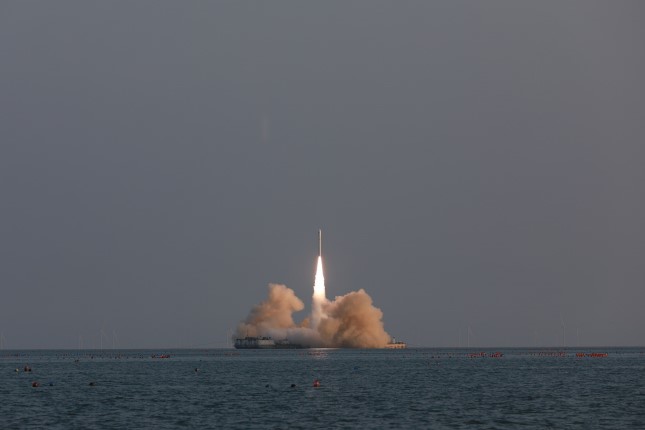In addition, the launch marked the world's first unsupported land and sea universal mobile platform launch and the world's first unguided hot launch of a solid rocket at sea, adding up to a number of breakthroughs in China's commercial launch sector since the start of the year.
Galactic Energy's mature rocket model Ceres 1 rocket carried the satellites Tianqi (known as Apocalypse in English) 21-24, belonging to the Tianqi constellation that is operated by Guodian Gaoke, a Beijing-based satellite operator.
The constellation, scheduled to complete deployment and put into operation in 2024, is made up of 38 low-orbit satellites and several ground stations.
The launch was conducted in Shandong's Haiyang, the only sea launch site in China that can meet various launch needs such as small inclination and sun-synchronous orbits.
"The launch is a big step for Galactic Energy as a player in the private sector, as it has broken through a set of challenging technologies, meanwhile, it advances China's prowess in the global fronts," Yang Yuguang, vice chair of Space Transportation Committee at the International Astronautical Federation, told the Global Times on Tuesday.
As the world's first launch using unsupported land and sea universal mobile platform on the sea, the Ceres-1 rocket used unguided hot launch for the first time considering the dynamic base launch environment under sea shaking conditions, Galactic Energy said in a note sent to the Global Times on Tuesday.
After the launch vehicle is transferred from land to sea, it is fixed on board.
The Ceres 1 rocket also adopts a high-precision navigation solution featured with maritime vertical self-alignment and online misalignment angle correction, also the world's first attempt, according to Galactic Energy.
Compared with conventional land-based launches, a sea mission has lower risk to the safety of densely populated areas and facilities where the falling parts of rockets could damage. In addition, under certain circumstances, the method allows launches to be made near to the equator, which could enhance rocket's carrying capacity and lower launch costs, Yang said.
"Meanwhile, sea-based launch has high-demanding requirements for the launch vehicle as it needs very precise calculation, test and operation to control the position, attitude and velocity of the rocket under a shaking sea environment," Yang noted.
Previously, only state-owned firm has conducted sea-based launch in China - four by the Long March 11 rocket and one by the Smart Dragon 3. Both belonged to the China Academy of Launch Vehicle Technology, a subsidiary of the China Aerospace Science and Technology Corp. Globally, only a few countries including the US, Russia and Ukraine have the technology.
"The sea launch successfully enriched the private firm's technology set in terms of both sea and land launches," Yang said, adding that domestic commercial space sector has been gaining strong momentum this year.
Galactic Energy has so far completed eight consecutive successful rocket launches, having kicked off a high-density delivery and launch cycle since the start of the year.
The company is also conducting research and development into liquid rocket technology.
In June, it announced that the Pallas 1, a larger, reusable liquid-propellant rocket model, had completed the inter-stage separation test, verifying the correctness of the separation scheme.
Tuesday's sea launch also added to a number of breakthroughs in China's commercial launch sector since the start of the year.
In July, LandSpace, another private rocket start-up, launched the world's first liquid oxygen, liquid methane carrier rocket from Jiuquan, a mileston that put China at the forefront of the global space race for methane-based rockets.
Source: The Global Times.
































